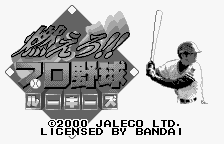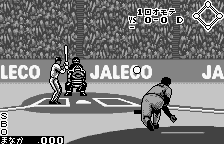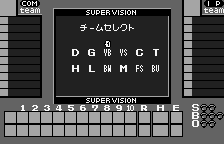
Original Release: Jaleco, 2000, Wonderswan
A forgotten entry in the Japanese source of the “Bases Loaded” series, this one is most reminiscent of the original NES games
Pro Yakyuu Rookies (Wonderswan, Jaleco, 2000)
Where to Buy: eBay
How to Emulate: coming soon!
 Review by: C. M0use
Review by: C. M0use

This entry in Jaleco’s “Bases Loaded” series is a real odd duck. There’s almost no information about it out there in English, the pages that cover the series largely don’t even seem to be aware that it exists (or are all just ignoring it for some reason). It also came out in 2000, yet it doesn’t at all resemble the SNES or PlayStation entries of the series … but it isn’t a simple port of the Game Boy title either!

It’s more like an enhanced version of the original NES games, with bigger and more detailed/well animated sprites in the pitching/batting view, and lots of digital audio clips of the umpire calling the shots. Just, of course, in black-and-white. But when you get to the field view, it’s the same old smushy low-detail sprites and iffy fielding.
It’s also totally untranslated, so I don’t know what the “Rookies” in the title is supposed to connotate, maybe that it’s simpler than the 16-bit console entries and you should lower your expectations. I never really cared for the original NES Bases Loaded series, despite its popularity, and that’s for a couple of reasons that continue to hold here.

One is just that it feels like it focuses too much on the looks of the pitcher-batter exchanges at the expense of everything else, like that’s a candy shell hiding what’s otherwise a very mediocre and generic baseball title. The actual gameplay always felt like Baseball Slot Machine to me, with very few options or feedback in both pitching and hitting … you kinda just press the button, with maybe a skosh of directional input, and hope for the best. And both you and the CPU almost never get power hits in under any circumstances, each game plays out as a collection of little singles and bloops that can feel maddeningly random especially when paired with the kinda weird scale of the field and player movement.
Anyway, same thing here. I also can’t do much of a dive into the game’s features due to minimal English, but it has the usual collection of 12 fictional teams, of course here based in Japanese cities. The Japaneseness also extends to the audio, where your mileage may vary but the non-stop banging and whistling drives me up a wall.
Videos
